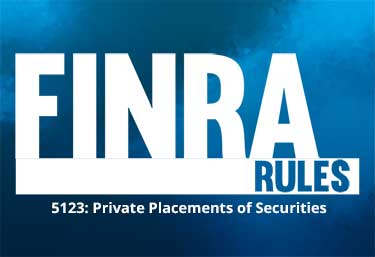 In December of 2012, the Financial Industry Regulatory Authority (FINRA) instituted a new rule that regulates its member firms’ participation in private placement securities offerings. This new regulation (FINRA Rule 5123) was designed to provide investors with additional protection.
In December of 2012, the Financial Industry Regulatory Authority (FINRA) instituted a new rule that regulates its member firms’ participation in private placement securities offerings. This new regulation (FINRA Rule 5123) was designed to provide investors with additional protection.
Here, the experienced FINRA arbitration attorneys at Sonn Law Group discuss private placements of securities and the requirements that FINRA member firms must now follow when offering these investments to their customers.
FINRA Rule Topics Covered Here
What are Private Placements of Securities?
Brokers are not allowed to sell unregistered securities to the public. Indeed, the SEC has strict requirements that compel all securities to be properly registered before they can be sold to retail investors on public markets.
A private placement is one of the only exceptions to the SEC’s securities registration requirements.

A private placement refers to the direct sale of securities to a private investor outside of the standard public offering process. In other words, private placements are not registered with the SEC or any similar state agency.
Instead, they rely on an exemption to the SEC registration rules. To use the exemption, private placements can only be offered to a limited number of investors. Indeed, only a narrow subset of investors qualify to ever purchase unregistered securities through a private placement.
FINRA RULE 5123 FAQ
The Basic Filing Requirements of FINRA Rule 5123
When securities are sold through a non-public offering, relying on the basic registration exception contained within the Securities Act, the brokerage firm offering the sale is required to do the following:
- Submit an accurate and up-to-date copy of the private placement term documents to FINRA within 15 calendar days of the initial sale; or
- Provide FINRA with official notification that there are no private placement documents.
In other words, FINRA Rule 5123 is a notification requirement. Registered broker-dealers and associated persons who participate in private placements of securities offerings must inform FINRA that such a transaction is occurring.
FINRA RULE 5123 FAQ
The Exceptions to FINRA Rule 5123
There are some limited exceptions to the general requirements of this rule. Brokerage firms are not required to disclose anything to FINRA under Rule 5123 if the private placement offering is sold to any of the following parties:
- An institutional account;
- A qualified purchaser;
- A qualified institutional buyer, as defined by Securities Act Rule 144A;
- An entity composed of qualified buyers;
- An investment company or a bank;
- An employee or affiliate of the issuer; or
- Knowledgeable employees.
Essentially, certain extremely sophisticated parties and certain insider parties may engage in private placement offerings without following the standard disclosure and notification requirements.
Contact Our Office Today
At Sonn Law Group, we have helped many wronged investors obtain full compensation for their losses. If you lost money investing in a private placement of securities, our investment loss attorneys can help.
Please do not hesitate to contact us today at 844-689-5754 or directly through our website to schedule your free initial legal consultation. From our offices in South Florida and Houston, Texas, we represent investors throughout the United States and in Puerto Rico.
CONTACT US FOR A FREE CONSULTATION
Se Habla Español
Contact our office today to discuss your case. You can reach us by phone at 844-689-5754 or via e-mail. To send us an e-mail, simply complete and submit the online form below.

